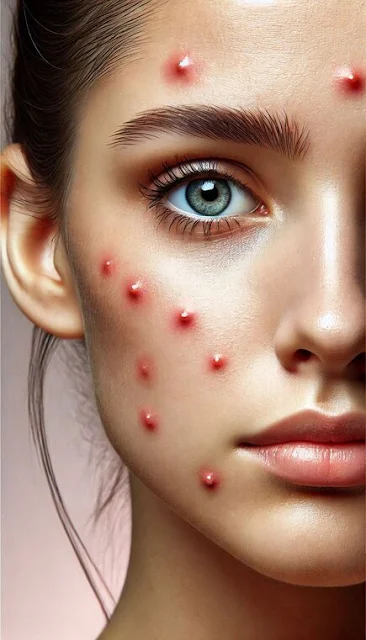The Comprehensive Guide to Zits on the Face, Exploring Solutions, and Implementing Prevention Techniques
Zits on the face can be a persistent problem, affecting not just your skin but also your confidence. In this article, we'll dive into the causes of facial zits, effective solutions, and prevention tips to help you achieve clearer skin. For more detailed guidance on treating acne quickly and effectively, check out our comprehensive guide on Easy Tips to Clear Acne Fast.
Understanding the science behind acne formation is crucial for developing an effective treatment strategy. When your pores become clogged with excess oil, dead skin cells, and bacteria, inflammation occurs, leading to those unwanted breakouts.
Factors like hormonal changes, stress, diet, and even certain skincare products can trigger or worsen acne, making it essential to identify your specific triggers and develop a personalized approach to treatment.

|
| Zits on Face |
Understanding Zits on the Face
What Are Zits on the Face?
Zits, commonly known as pimples or acne, occur when hair follicles become clogged with oil, dead skin cells, and bacteria. This condition manifests as small red bumps, pustules, or even cysts on the skin. While zits can appear anywhere, the face is particularly prone due to its high concentration of oil-producing glands.
Why Do Zits Appear?
Zits often develop due to a combination of factors:
-
Excess Sebum Production: Hormonal changes, particularly during puberty, can trigger overproduction of oil.
-
Clogged Pores: Dead skin cells and oil can accumulate in hair follicles, creating blockages.
-
Bacteria: The bacterium Propionibacterium acnes flourishes in obstructed pores, resulting in inflammation.
-
Lifestyle Factors: Stress, diet, and improper skincare can exacerbate the issue.
Effective Ways to Manage and Prevent Zits
1. Maintain a Proper Skincare Routine
A consistent skincare regimen is crucial:
-
Utilize a gentle: non-comedogenic cleanser twice each day to effectively eliminate dirt and surplus oil.
-
Exfoliate: Incorporate a chemical exfoliant containing salicylic acid or glycolic acid to clear clogged pores.
-
Moisturize: Choose lightweight, oil-free moisturizers to keep skin hydrated without adding excess oil.
2. Optimize Your Diet
Research suggests that certain foods can worsen acne. Focus on:
Low-glycemic foods like whole grains and vegetables.
Reducing dairy and sugary treats.
3. Avoid Touching Your Face
Your hands carry bacteria that can worsen acne. Refrain from picking or squeezing zits to prevent scarring.
4. Improve Your Sleep and Stress Management
Lack of sleep and high stress levels can trigger hormonal changes that exacerbate acne. Prioritize quality sleep and relaxation techniques.
Additional Tips for Clearer Skin
-
It is advisable to apply sunscreen with an SPF of 30 or greater on a daily basis to safeguard against ultraviolet damage.
Change pillowcases frequently to reduce bacteria exposure.
-
Opt for oil-free makeup and remove it thoroughly at the end of the day.
Real-Life Data: The Impact of Consistency
A study published in the Journal of Dermatology found that individuals who adhered to a consistent skincare routine for 12 weeks saw a 60% reduction in acne lesions. This emphasizes the importance of regular care and patience in achieving results.
Additional Explanation Through Youtube Video Reference
The following video will help you understand the deeper concepts:
The video above provides additional perspective to complement the article discussion
Conclusion
Zits on the face may be a common challenge, but they are manageable with the right approach. By understanding the causes, adopting a targeted skincare routine, and making lifestyle adjustments, you can take control of your skin’s health. Embark on your path to achieving clearer skin today and restore your self-assurance.
FAQ
1. Can stress cause zits on the face?
While stress doesn’t directly cause acne, it can trigger hormonal fluctuations that increase oil production, leading to breakouts.
2. Are natural remedies effective for zits?
Natural remedies like tea tree oil or aloe vera can help reduce inflammation, but they should complement, not replace, proven treatments.
3. What is the typical duration required to observe results from acne treatments?
Results vary, but most people notice improvements within 4-6 weeks of consistent treatment.
No comments:
Post a Comment
Your comments fuel my passion and keep me inspired to share even more insights with you. If you have any questions or thoughts, don’t hesitate to drop a comment and don’t forget to follow my blog so you never miss an update! Thanks.